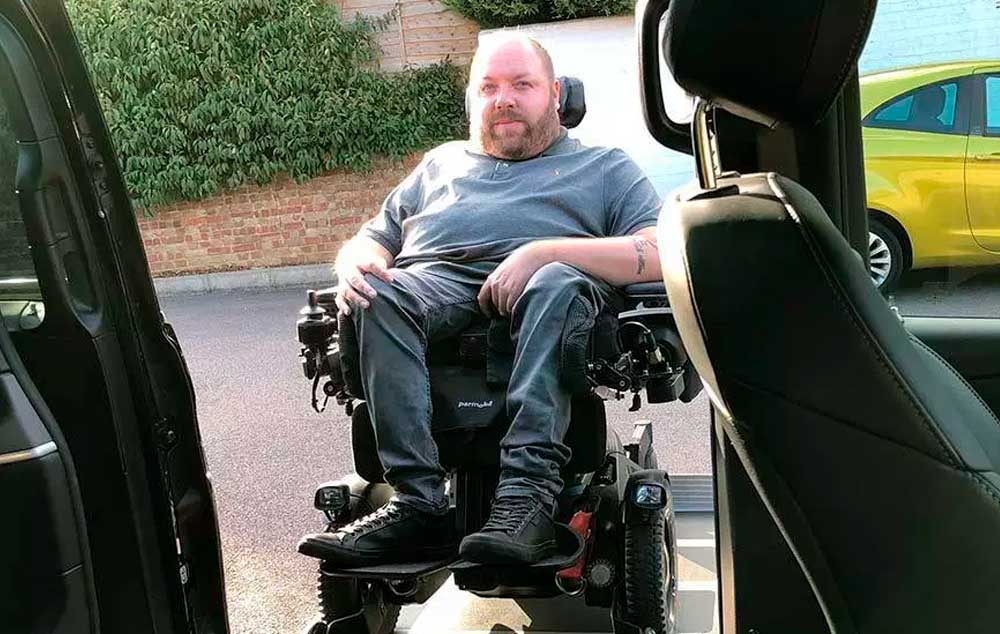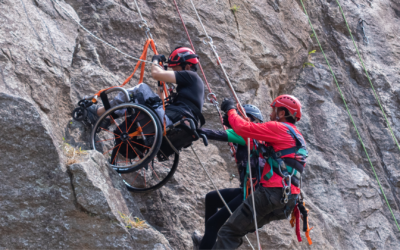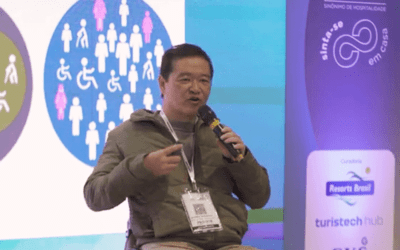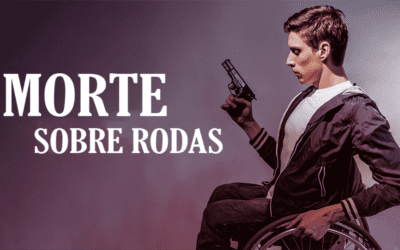
Games Makers: the story of one wheelchair user
Many have said that the success of the London 2012 Olympic Games has been largely thanks to the enthusiam and tireless work of the Games Makers. So we spoke to one of them, wheelchair user Ross Hovey, about his experiences.
I am 33 years old, from Cambridgeshire and have spinal muscular atrophy type II as well as a spinal fusion. I work for Lloyds Banking Group in HR, official partners of the Olympic Games, who negotiated 250 Games Maker volunteer spaces for employees.
Approximately 20,000 of my colleagues and I applied to be a Games Maker, of which 450 were shortlisted and interviewed by LOCOG (London Organising Committee of the Olympic and Paralympic Games). 250 of us, including me, were lucky enough to be offered a role as a Games Maker. The end-to-end process of applying, training and undertaking the role took about two years in total.
I was offered a role in the Protocol Team at Earls Court for the men’s and women’s volleyball; unfortunately not the beach volleyball! The responsibility of the Protocol Team is to look after the ‘Olympic Family’ guests, i.e. dignitaries, ambassadors, officials, judges, heads of states, athletes family and celebrities involved with the games.
Within this role we undertook several jobs, but primarily we were additional security and access control ensuring that only those with specific accreditation entered into exclusive areas. Some parts of the job were quite mundane, for example sitting at an accessible VIP entrance for a hour during which time nobody with accessible needs arrived.
However, other jobs were more exciting, such as manning the entrance to the Olympic Family seats and Olympics Family lounge where we welcomed VIPs and ensured their needs were fully taken care of.
Working there, I was fortunate enough to meet a number of famous faces; Lord Sebastian Coe, Paul Dyton (CEO of LOCOG), Avram Grant (ex Chelsea FC manager) and other people such as national presidents. Prince Edward also came for a tour of our venue, but sadly I didn’t get to meet him in person, I merely got a glimpse of him whilst he chatted to the many soldiers on duty!
Initially I was to be posted at Hyde Park and Lords for the triathlon and archery, but these venues were deemed to be not accessible for me to work at. They only realised this a month or two before the start of the Olympic Games, which was rather alarming, especially considering they knew I was disabled from the start.
There were a lot of challenges involved in being a Games Maker and using a wheelchair. The hours were long and I had to commute daily, which involved asking home carers to come in at 4am to get me up and showered, and put me to bed at 2am when I got in from a late shift, for which I had to give them with higher pay.
Because I work for a partner of the Olympic Games and 50% of my time was still paid, I was able to continue using my Access to Work support worker. However, with fourteen hour days and only forty five hours support per week, I could have easily gone over budget.
But by budgeting I managed to avoid issues; I paid support workers in advance for hours they would be doing extra, and in the following weeks, where I don’t use my maximum hours, I will be paying some support workers in arrears for hours undertaken.
Getting in and out of London was challenging. Luckily LOCOG gave me a free parking pass for the venue so despite the expense I drove in and out of London daily. Having a congestion waiver because of my disability helped too!
If I had any criticism of the whole experience it was the shortsightedness of LOCOG in terms of how they dealt with support workers. For example, accreditation and my uniform had to be collected from a specific place at a specific time. However, they didn’t think it would be practical for my support worker to collect his at the same time, instead he had to go another day.
As I had to nominate three support workers for contingency I had to pay all three the extra hours required to each go and collect the accreditation, when I could have saved time and money by getting them to all come with me when I collected mine.
Support workers also had no uniform so stood out like a sore thumb, which felt awkward and embarrassing when VIPs arrived. There was also confusion over what support workers were entitled to in terms of meal vouchers.
But these were minor niggles and in general, my disability was catered for. The overall experience was good, despite how tired I felt. It was a once in a life time opportunity and I am proud that I helped make the games happen. Maybe I will consider applying for Rio 2016?!?
Source: Disability Horizons
Compartilhe
Use os ícones flutuantes na borda lateral esquerda desta página
Siga-nos!
Envolva-se em nosso conteúdo, seus comentários são bem-vindos!
Artigos relacionados
Teleton AACD. A pessoa com deficiência como protagonista.
Teleton AACD. A pessoa com deficiência como protagonista. Uma iniciativa internacional abraçada pelo SBT no Brasil.
Acessibilidade no ESG. Equipotel aborda o tema para o turismo.
Acessibilidade no ESG, para o mercado do turismo. Equipotel aborda a importância da inclusão da pessoa com deficiência.
Morte Sobre Rodas. Filme inclusivo foi candidato ao Oscar.
Morte Sobre Rodas. Dois protagonistas do filme, são pessoas com deficiência, um usuário de cadeira de rodas e outro com paralisia cerebral.






0 comentários